The Introduction to Global Studies course, an English-taught course offered by Assistant Professor Shun-Nan Chiang of the International College of Innovation (ICI), held its first Round-Table Project of the semester on October 1. Under the theme “What is the So-called Globalization from Our Experience and Perspective?”, students worked in groups to analyze how globalization manifests across different domains. Drawing on their diverse transnational backgrounds and life experiences, they reinterpreted global issues from local perspectives to reveal the multiple faces of globalization.
From Global Governance to Technology and Sustainability — Introducing a “World Society” Perspective
Introduction to Global Studies is a core first-year course at ICI. The course aims to guide students beyond the framework of individual nation-states and help them understand the shared conditions of contemporary humanity as well as various issues of inequality through the perspective of a global society. Covering three major dimensions—the international order within political and economic structures, contemporary ecological and environmental challenges from a global historical perspective, and how science, technology, and innovation (STI) reshape the development of global society—the course incorporates collective reading and writing before class, The World This Week global news curation, group discussions, and Round-Table Projects to progressively guide students in building foundational knowledge and cultivating a global perspective through reading, discussion, and practice.
Diverse Student Perspectives — From Orbital Debris to Educational Globalization and Green Finance
In this Round-Table Project, students demonstrated strong critical thinking and global awareness. Group 7 focused on space debris governance, highlighting that orbital waste has already threatened global communication and space security. The group also pointed out that disparities in national technological development have created another form of inequality, and called for the establishment of binding international regulations that recognize outer space as “a common asset of humankind.”
Group 2 examined educational globalization, analyzing how English serves as a medium of instruction in more than 180 countries, and exploring how Turkey, Indonesia, and the EU’s Erasmus Program localize global education models.
Group 8 discussed green finance and capital flows, noting that while Indonesia, the Philippines, Vietnam, and Taiwan have great potential in renewable energy development, inequality in funding and international standards remains an obstacle. The group called for a fairer and more inclusive framework for sustainable finance.
Instructor Shun-Nan Chiang: Students Surpassed Expectations, Demonstrating True Collaboration and Knowledge Internalization
Assistant Professor Shun-Nan Chiang, the course instructor, explained that this year’s Introduction to Global Studies adopted a new instructional format in response to the characteristics of ICI students and feedback from previous years. The course reform was also supported by the Teaching Development Community program of NCCU’s Center for Teaching and Learning Development. Together with Dr. Hung-Ying Chen and Dr. Tzu-Chi Ou from ICI, Professor Chiang jointly invited Dr. Hao-Tzu Ho and Dr. I-Chang Kuo from the Graduate Institute of Development Studies, NCCU to form a teaching development community titled “Localization of Global Humanities and Social Science EMI Courses.” The new course design was developed based on this collaborative initiative.
This Round-Table Project featured not only student presentations but also commentary from ICI faculty discussants Dr. Tzu-Chi Ou and Dr. Yung-Yu Tsai, who expanded and synthesized discussions on globalization from multiple perspectives while offering students valuable insights that enriched the overall depth of the activity. In addition, the second part of the class extended into an interactive session combining poster creation and oral presentation, allowing students to reorganize and articulate their knowledge through visual and verbal expression to reinforce learning outcomes.
Professor Chiang remarked that the students’ performance far exceeded expectations: “They managed their presentation time effectively, demonstrating thorough preparation. Their topics and analyses followed the original outlines while extending the discussion meaningfully, applying what they learned in class to their case studies.” Although the session was somewhat tight on time, the students’ active engagement and the full participation of the two discussants made the event a complete success.
Faculty Discussants: Collaboration and Global Awareness in Action
ICI’s Dr. Tzu-Chi Ou, who served as a discussant, commented that students demonstrated impressive collaborative efficiency, integrating diverse viewpoints and visualizing the complex dimensions of globalization within a short time. “I was particularly delighted to see students from different countries responding to the same topic from different perspectives,” she noted.
Another discussant, Dr. Yung-Yu Tsai, praised the students’ performance: “They showed not only a global outlook but also a strong sense of social responsibility. From human rights and environmental issues to technology and culture, students proposed concrete ideas for action, demonstrating ICI students’ interdisciplinary thinking and social commitment.”
The course will continue with the second and third Round-Table Projects, focusing respectively on “Youth voices across the world for climate justice – what are their agendas for COP30” and “Transitioning to renewable energy vs. The rise of AI boom – exploring the diverse positionings.” At the end of the semester, the class will culminate in a final exhibition titled “Me/Us ___ the World.” Introduction to Global Studies serves not only as students’ entry point into ICI but also as a vital foundation for cultivating cross-disciplinary thinking and global engagement. The course aspires for students to go beyond analyzing global issues—to reflect on their own roles within the global network, to develop self-directed learning and practical action, and to become leaders capable of participating in and transforming globalization.
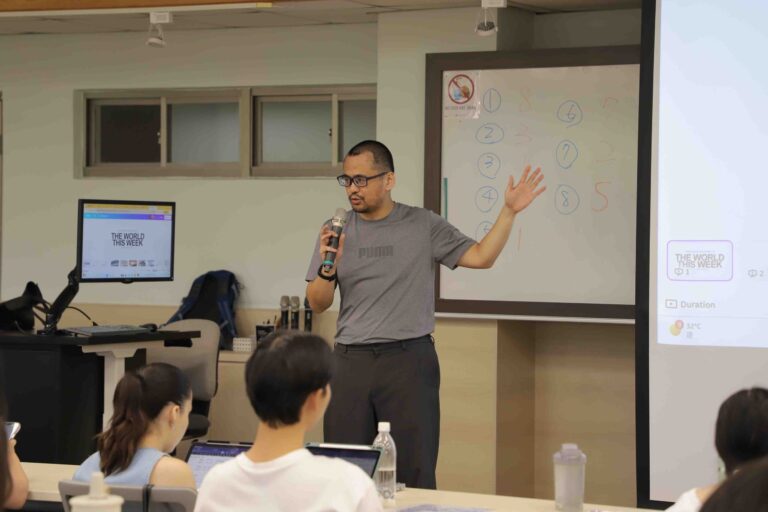 Assistant Professor Shun-Nan Chiang explains the course content. (Photo credit: ICI)
Assistant Professor Shun-Nan Chiang explains the course content. (Photo credit: ICI)
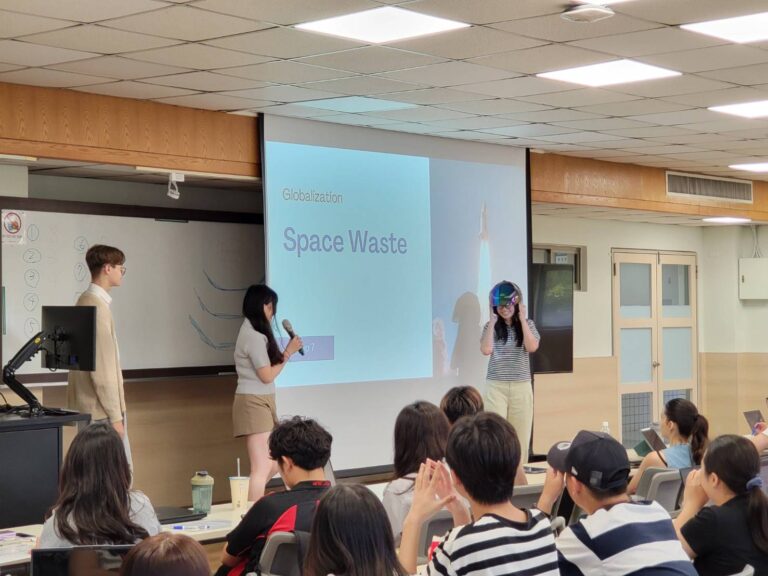 Group 7 students present their project titled “Space Waste.” (Photo credit: ICI)
Group 7 students present their project titled “Space Waste.” (Photo credit: ICI)
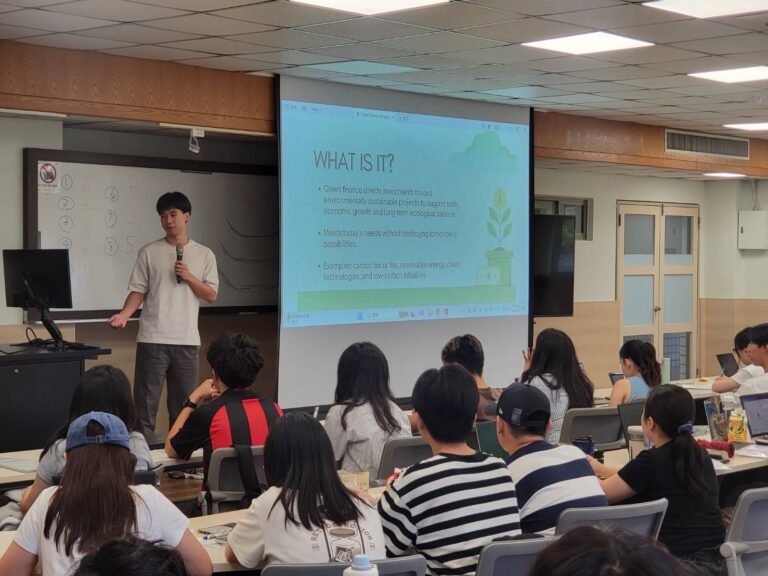 Group 8 students present their project titled “Green Finance & Sustainability.” (Photo credit: ICI)
Group 8 students present their project titled “Green Finance & Sustainability.” (Photo credit: ICI)
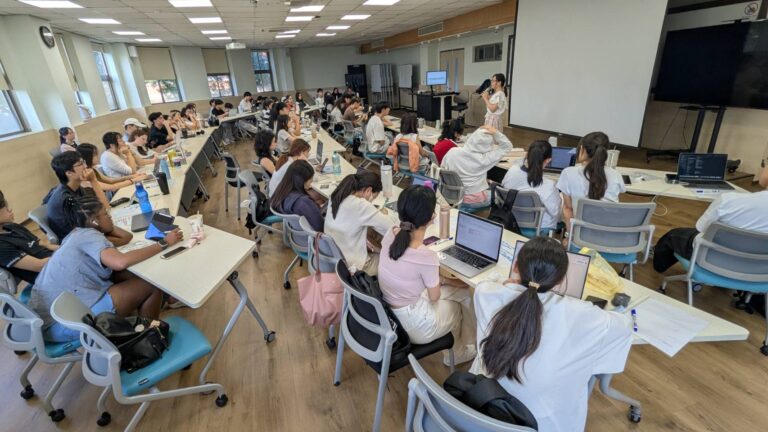 Discussant Dr. Yung-Yu Tsai from ICI shared her insights in class, offering in-depth analyses of the meanings of globalization from multiple perspectives and synthesizing key points from each group’s presentation and discussion. (Photo credit: ICI)
Discussant Dr. Yung-Yu Tsai from ICI shared her insights in class, offering in-depth analyses of the meanings of globalization from multiple perspectives and synthesizing key points from each group’s presentation and discussion. (Photo credit: ICI)
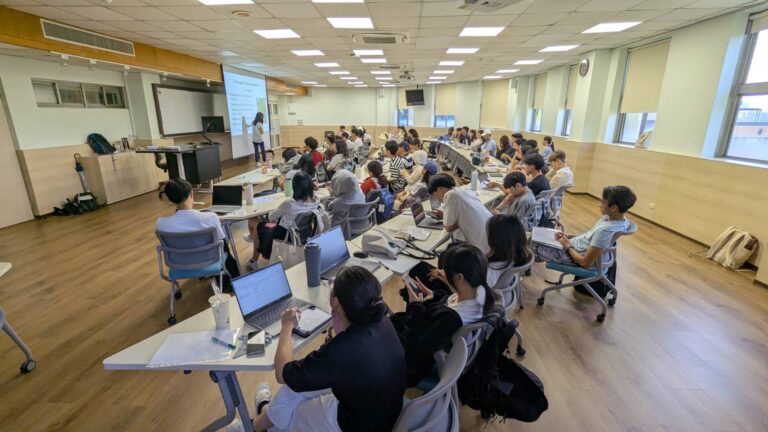 Discussant Dr. Tzu-Chi Ou from ICI shared her insights in class, offering in-depth analyses of the meanings of globalization from multiple perspectives and synthesizing key points from each group’s presentation and discussion. (Photo credit: ICI)
Discussant Dr. Tzu-Chi Ou from ICI shared her insights in class, offering in-depth analyses of the meanings of globalization from multiple perspectives and synthesizing key points from each group’s presentation and discussion. (Photo credit: ICI)
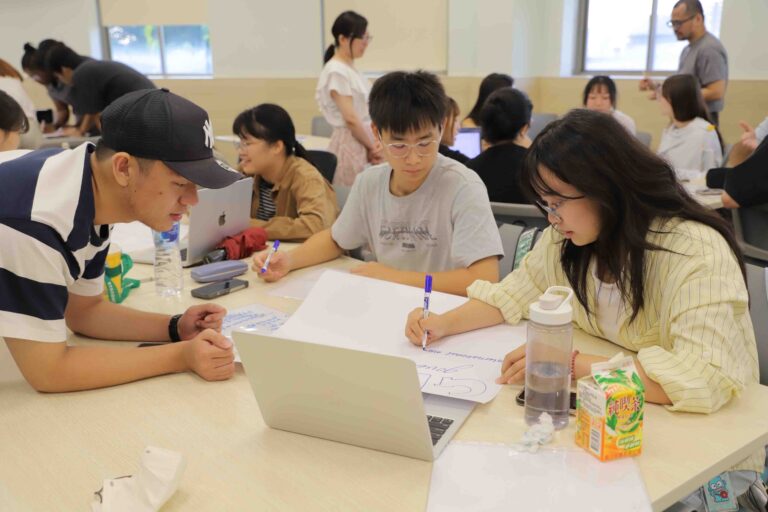 In the second phase of the course, students continued their discussions under the themes “Models of Global Governance” and “Tensions between the Local and the Global.” (Photo credit: ICI)
In the second phase of the course, students continued their discussions under the themes “Models of Global Governance” and “Tensions between the Local and the Global.” (Photo credit: ICI)
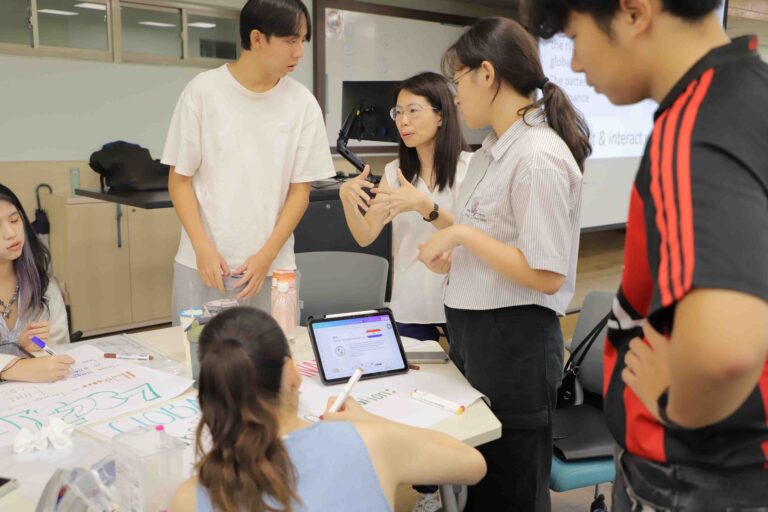 Discussant Dr. Tzu-Chi Ou (third from right) from ICI provides feedback and comments on students’ presentations. (Photo credit: ICI)
Discussant Dr. Tzu-Chi Ou (third from right) from ICI provides feedback and comments on students’ presentations. (Photo credit: ICI)
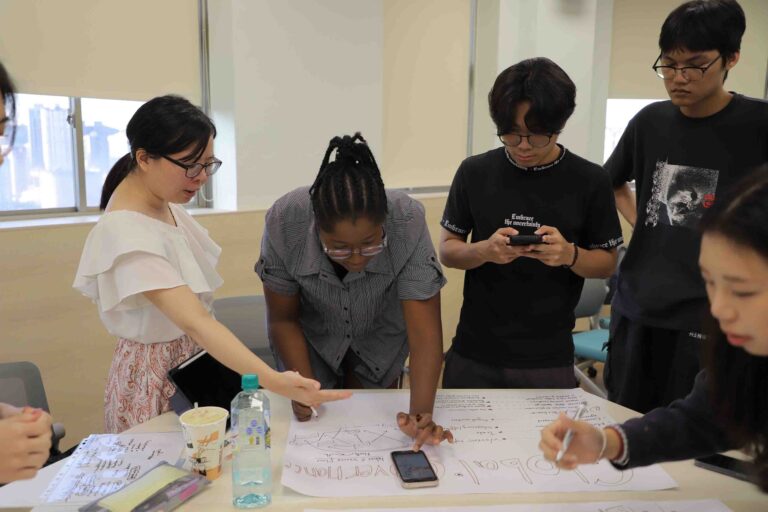 Discussant Dr. Yung-Yu Tsai (first from left) from ICI provides feedback and comments on students’ presentations. (Photo credit: ICI)
Discussant Dr. Yung-Yu Tsai (first from left) from ICI provides feedback and comments on students’ presentations. (Photo credit: ICI)
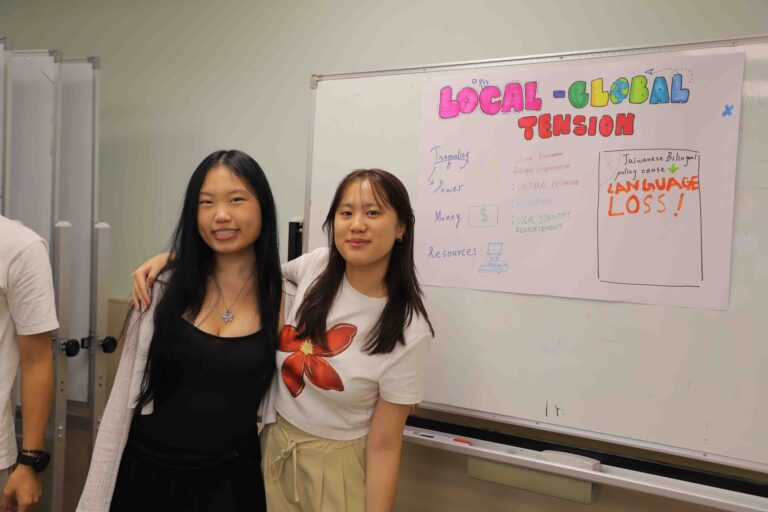 Students presented their key discussion points through an infographic poster and took a group photo with their work. (Photo credit: ICI)
Students presented their key discussion points through an infographic poster and took a group photo with their work. (Photo credit: ICI)
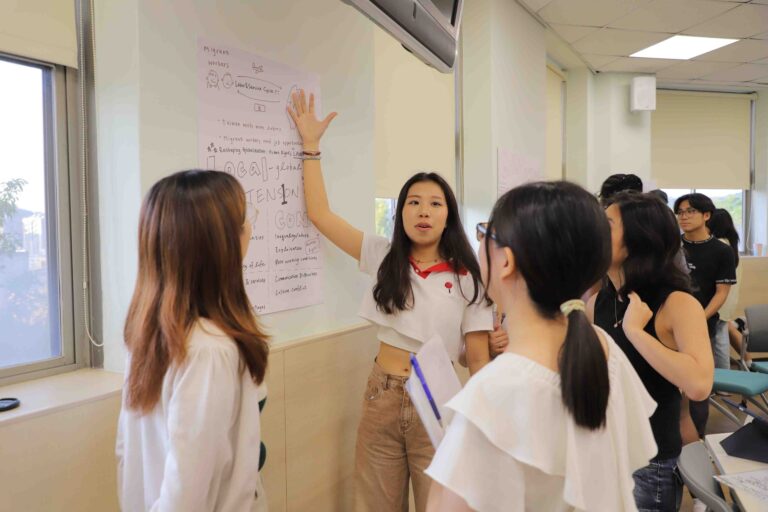 Students explained the concept behind their infographic poster to classmates and faculty. (Photo credit: ICI)
Students explained the concept behind their infographic poster to classmates and faculty. (Photo credit: ICI)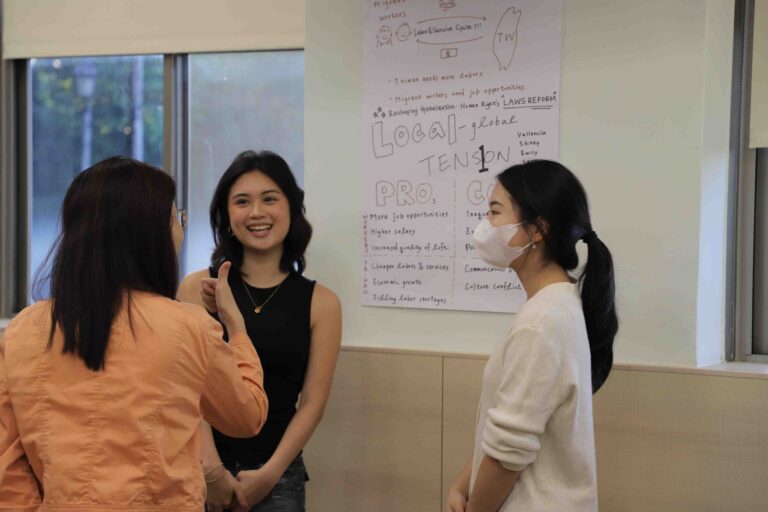
Students explained the concept behind their infographic poster to classmates and faculty. (Photo credit: ICI)
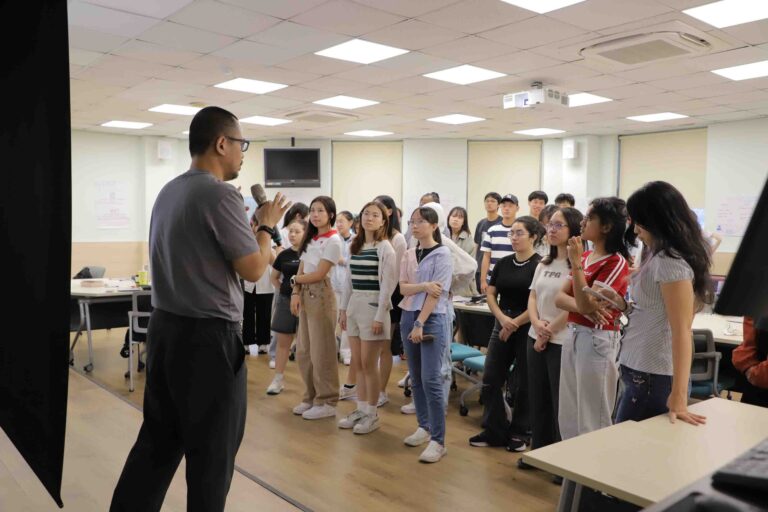 Assistant Professor Shun-Nan Chiang (first from left) explains the course. content. (Photo credit: ICI)
Assistant Professor Shun-Nan Chiang (first from left) explains the course. content. (Photo credit: ICI)





